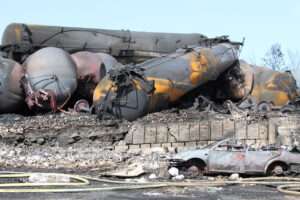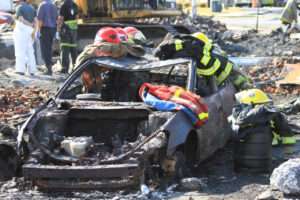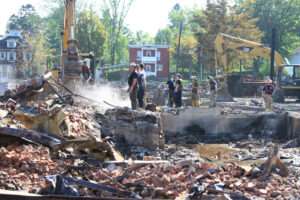It was originally published in the Townships Sun (July/August 2023). Congratulations, Marie Moliner!
10 Years Ago, Downtown was Devastated
Megantic, Then and Now
by Marie Moliner
|
“You had flames, about two or three feet high on the lake. That was something to see.” – Corey Bellam, photographer, about the Lac-Mégantic train explosion July 6, 2013 How do you live through a disaster of epic proportions? What if the risk of recurrence unsettles your thoughts each time the train chugs through town? This is life for residents in Megantic, Quebec, ten years after the Montreal, Maine & Atlantic Railway freight train MMA-002 carried 7.7 million litres of crude oil into its downtown, derailed at 1:14 a.m., exploded, incinerated its core, and vaporized almost 50 people. That night, photographer Corey Bellam was listening to the radio. |
 |
|
He lives near Megantic and reports for The Colebrook Chronicle in northern New Hampshire. Around midnight he heard that a train engine, parked overnight, had caught fire near Nantes, a town uphill from Megantic. “When I heard the news, I headed straight for Megantic,” said Bellam. Driving, he soon saw a glow in the sky. He was among the first journalists to arrive, witnessing another explosion. “You could hear sirens. People were walking around with the blankest look on their faces. Others were standing in the middle of the street screaming at the top of their lungs.” Clearly, the memory still haunts him. I ask if he has PTSD. He says he does not. Others do. |
 |
|
Imagine life in Megantic, once a thriving town. Despite its best rebuilding efforts, the town centre remains a moonscape ten years later. This is the above-ground evidence of disaster. Bellam digs deeper, “For years there was a smell of oil along the commemorative boardwalk. You wouldn’t want to grow cucumbers in that soil.” As the trains roll through, longer and heavier, Mayor Julie Morin speaks of “the human impact” and “the collateral damage.” Elected in 2017 at age 34, Morin is tackling the complexity of a grieving community. When the train rolls through, at least four times a day, she shudders, “Ever since the accident, we can’t concentrate. Not everyone heals the same way.” In her view, residents cannot mend as long as “the murderer is still in the house.” |
 |
Photos by Corey Bellam.
She insists that Megantic must become known as “more than the town where the disaster happened. We will recover. We are better at supporting each other. We have specialized social workers on the ground. We have developed tools together and a strong social fabric that will allow us to heal.”
Still, she worries that trauma will be rekindled as a recent documentary series and a television drama profile the community. She watched Lac-Mégantic – This is Not an Accident, the documentary by Oscar-nominated film-maker, Philip Falardeau.
“Those films shocked me! I realized that the government and railroad companies have not learned anything from the disaster.” On point, Falardeau told the Montreal Gazette,“The ticking time bomb is still active. At some point it’s going to happen in downtown Calgary or in Magog.”
Indeed, it has. This year, on April 15, on the same line. A CN train carrying hazardous material derailed in Rockwood, Maine, ninety kilometres from Megantic. The cause was debris on washed-out tracks. It was “an absolute miracle” the local fire chief told the media, describing how three crew members broke windows to escape the ensuing forest fire. Transportation consultant, Greg Gormick, blamed the Rockwood derailment on “the deferred maintenance every observant railroader knows has been built up over a period of more than 30 years through four changes of ownership”(Montreal Gazette).
In 2019, three railway workers were killed in Field, BC, when their train plummeted off a bridge, caused by air leaks in aging brake cylinders. The Transportation Safety Board‘s report noted that earlier warnings of brake system irregularities were not seen as problematic.
On January 26, 2021, in the same location, 32 cars carrying grain derailed. The Transportation Safety Board did not deploy an investigator to the site, reported Transport Canada.
About 1,250 derailments have occurred each year over the past decade in the USA, per American Federal Railroad Administration data reported by USA Today. Are derailments the cost of doing business by rail?
Robert Asselin echoes the conclusions of the Transportation Safety Board report into the Megantic event: Montreal, Maine & Atlantic Railway (MMA) was a company with a “weak safety culture.”
“I was born on the tracks,” he says. “The railway ran 100 feet from my childhood home in Valleyfield, Quebec. So maybe I am more comfortable than most with trains.”
He retired after 50 years working for CN, like his father and grandfather. His career was managing signals and communications―key elements of rail safety. Asselin is now Mayor of Newport, Quebec.
He links the Megantic disaster to the 1995 privatization of CN. Bruce Campbell’s book, The Lac-Mégantic Rail Disaster: Public Betrayal, Justice Denied, spells out the consequences of this deregulation. Asselin winces as he recalls the corners being cut while he was working for the railroad. “It is a shame that it took Megantic to turn things around.”
Asselin joined the new company’s rebuilding efforts after MMA went bankrupt. He says it can be safe for trains to carry dangerous goods. He is succinct. “The rules were not followed. That is why Megantic happened. This disaster was avoidable.”
Indeed, it was avoidable…
-
If only the rail line into Megantic had been built with fewer inclines, described by Asselin as the most difficult in Canada.
-
If only the train had not been carrying Bakken crude oil, so flammable that North Dakotans have bragged about using it unrefined (Globe and Mail).
-
If only privatization and cost cutting over decades had not led to a one-man crew on a train carrying millions of litres of flammable liquid.
-
If only management had heeded multiple alerts about rail, container, and engine deficiencies. (The Megantic train engineer reported that the engine was hot and spitting black smoke. He was told not to worry and that it would be looked at the next morning).
-
If only the train had not been parked on the main track in Nantes.
-
If only the engine had not caught fire shortly after the train engineer left.
-
If only firefighters had known that the train’s manual brakes would fail when they turned off the engine to extinguish that fire.
-
If only the train engineer, asleep in a nearby hotel, had been called directly by the firefighters and asked what to do next. (Instead, firefighters called a railway manager who was not a train engineer.)
-
If only those in charge at the top had not repeatedly turned a blind eye.
Yes, if only any of these things has happened differently, this disaster might have been avoided. But because the air brakes decompressed, because there was no derailer to stop the train rolling away, because gravity pulled Train 5071 downhill, it became a “Dementor,” a black spectre speeding up to 100 km/hour. It derailed in the heart of Megantic, releasing six million litres of crude oil, forming a four-foot wave of oil which ignited almost immediately. It burned for almost three days, thoroughly contaminating the downtown soil.
Forty seven friends and family members, most of them inside the Musi-Café, died almost instantly that warm summer night. Two thousand people were evacuated.
Lessons learned are listed in a Transportation Safety Board report, but residents want a public inquiry. Mayor Morin was shocked to learn (from the Falardeau film) that the decision to not proceed with a public inquiry was made by the federal (Harper) government less than a week after the disaster. Both Morin and Asselin say an inquiry remains important. It would bring attention to ongoing risks while clarifying accountability for future disasters.
The community is both united in their grief and conflicted about their future. A recently promised rail bypass remains in limbo despite expropriation decisions. Neighbouring towns and local residents are pitted against each other. Some debate whether the bypass is necessary. Others encourage it to be built anywhere but their backyard.
Asselin notes that risks will always exist. He asks the critical question: “Do you want dangerous goods transported by rail, or by road?”
“Rail transport is safe if the rules are followed,” he repeats. “It is as safe to live in Megantic as it is to live anywhere a train runs through your village.”
Meanwhile, Mayor Morin hopes the bypass will be built beginning next spring.
Today, Megantic struggles to rebuild its once bustling town centre. Dollarama occupies a prominent position on the main street, emblematic of our society’s preference for cheap goods transported at a human cost. How long does it take to recover from such visceral and architectural trauma?
Ten years is not a long time. A hundred years may not be long enough. Yet, Mayor Morin is unequivocal about the town’s future. “We are more than the disaster. We’re a tight community and our strength will endure and evolve with the rhythm of our residents. My wish is for a town that is proud of its resilience and is able to move forward.”
 |
||
|
On July 8, a “comfort concert” will be free of charge at Veterans Park in Megantic. |
On the disaster’s 10th anniversary, the mayor acknowledges the delicate balance required to honour the town’s grief with a need to let the outside world know Megantic is alive and welcoming. This year, beginning July 5, memories of all that was lost will be commemorated during a mass, a baroque recital, a silent vigil and a “comfort concert.”
If you ask me, “Would you move to Megantic?” I would pause before saying yes. Yes, because it has probably never been safer to live there, given renewed scrutiny on rail safety. Yes, because the countryside is spectacularly beautiful.
Yes, because we recently visited the Musi-Café, rebuilt 400 metres from its original location. Exceptionally friendly staff went out of their way to make us feel welcome. We felt the town’s heart beat. I also ate the best lobster roll, ever.
And yet, as we sit on the Musi-Cafe’s sun-soaked patio, a train trundles by. Everyone stops talking…and watches…and wonders.
|
Marie Moliner is Assistant Editor of the Townships Sun and enjoys the magic of her surroundings every day. |
|


